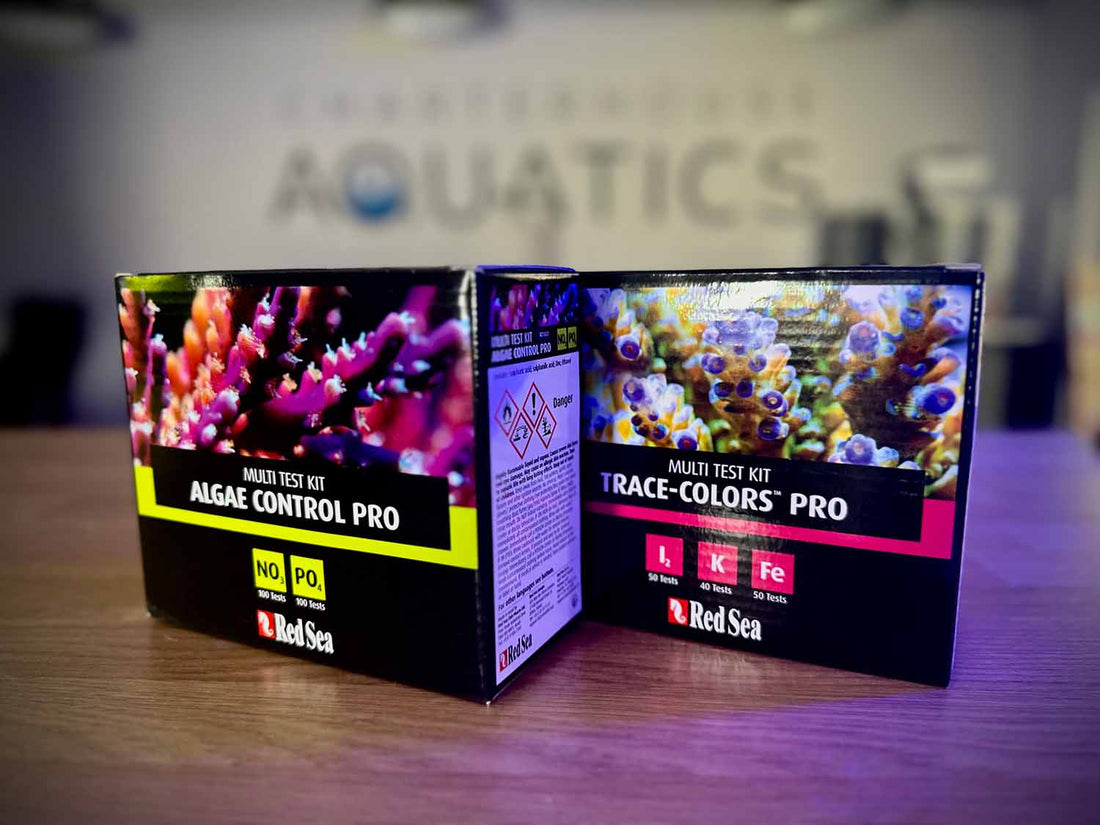Maintaining a healthy and thriving reef aquarium requires regular monitoring of various water parameters. Consistent testing helps ensure that your aquatic environment remains stable and suitable for all inhabitants. In this blog post, we’ll explore the key parameters you should test for in a reef aquarium, their importance, and how frequently you should perform these tests. We’ll also provide links to top products available at Charterhouse Aquatics to help you maintain optimal water quality.
Key Parameters to Test in a Reef Aquarium
1. Ammonia (NH3/NH4)
Importance: Ammonia is highly toxic to fish and invertebrates. Even small amounts can cause stress, illness, and death. It is the first compound in the nitrogen cycle and should always be at zero in a healthy, established reef tank.
Frequency: Test weekly, especially in new setups or after adding new livestock.
Recommended Product: API Ammonia Test Kit
2. Nitrite (NO2)
Importance: Nitrite is also toxic to marine life. It is an intermediate product of the nitrogen cycle, converted from ammonia by beneficial bacteria. Nitrite levels should be zero in a mature reef tank.
Frequency: Test weekly, particularly in new tanks or after changes in bioload.
Recommended Product: Salifert Nitrite Test Kit
3. Nitrate (NO3)
Importance: Nitrate is less toxic than ammonia and nitrite but can still be harmful at high levels. Elevated nitrate levels can lead to algae blooms and poor coral health. Aim to keep nitrate levels below 10 ppm in reef tanks.
Frequency: Test weekly to bi-weekly.
Recommended Product: Red Sea Nitrate Pro Test Kit
4. pH
Importance: pH measures the acidity or alkalinity of the water. Stable pH levels are crucial for the health of fish and corals. The ideal pH range for a reef tank is 8.1-8.4.
Frequency: Test weekly.
Recommended Product: API Saltwater pH Test Kit
5. Alkalinity (KH)
Importance: Alkalinity helps stabilize pH and provides essential carbonate ions for coral growth. Maintaining proper alkalinity levels (7-11 dKH) is critical for coral health and calcification.
Frequency: Test weekly.
Recommended Product: Hanna Marine Alkalinity Checker
6. Calcium (Ca)
Importance: Calcium is essential for the growth and health of corals and other invertebrates. The optimal range for calcium in a reef tank is 400-450 ppm.
Frequency: Test weekly to bi-weekly.
Recommended Product: Salifert Calcium Test Kit
7. Magnesium (Mg)
Importance: Magnesium is crucial for maintaining calcium and alkalinity balance. It also plays a role in coral health. The ideal range for magnesium is 1250-1350 ppm.
Frequency: Test weekly to bi-weekly.
Recommended Product: Red Sea Magnesium Pro Test Kit
8. Phosphate (PO4)
Importance: Phosphates can fuel algae growth and inhibit coral growth and calcification. Keeping phosphate levels below 0.03 ppm is recommended for reef tanks.
Frequency: Test weekly.
Recommended Product: ATI Phosphate Test Kit
9. Salinity
Importance: Salinity is the measure of salt concentration in the water. Stable salinity levels (1.025-1.026 specific gravity) are vital for the health of marine life.
Frequency: Test weekly.
Recommended Product: Red Sea Refractometer
Conclusion
Regular testing of these key parameters is essential for maintaining a healthy reef aquarium. By understanding the importance of each parameter and keeping track of their levels, you can ensure a stable and thriving aquatic environment for your marine life. Explore the range of test kits and other maintenance products available at Charterhouse Aquatics to support your reef tank’s needs.
For all your aquarium maintenance requirements, trust Charterhouse Aquatics to provide top-quality products and expert advice. Invest in the right tools and solutions to keep your reef tank healthy and vibrant.


